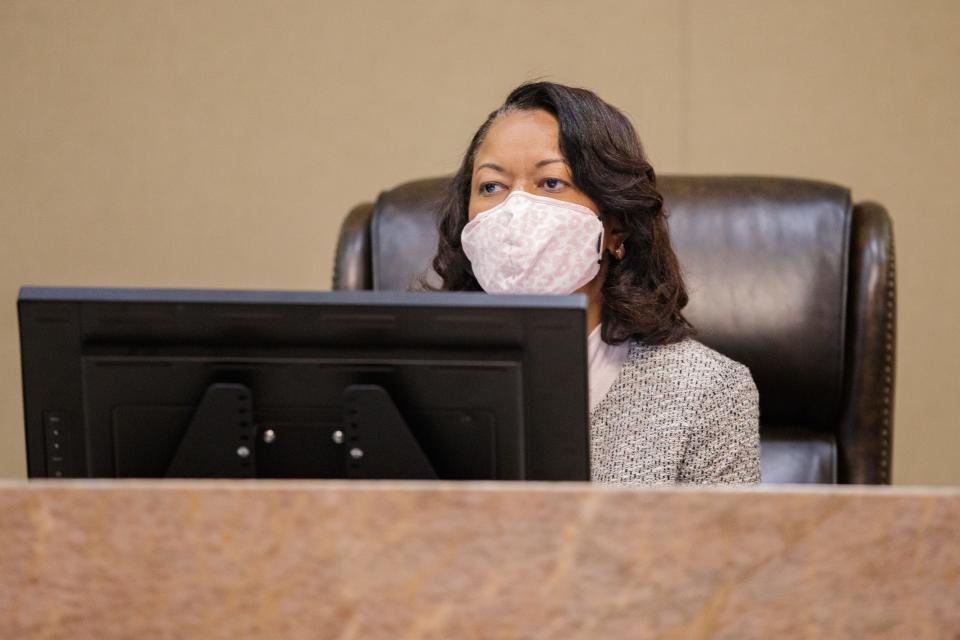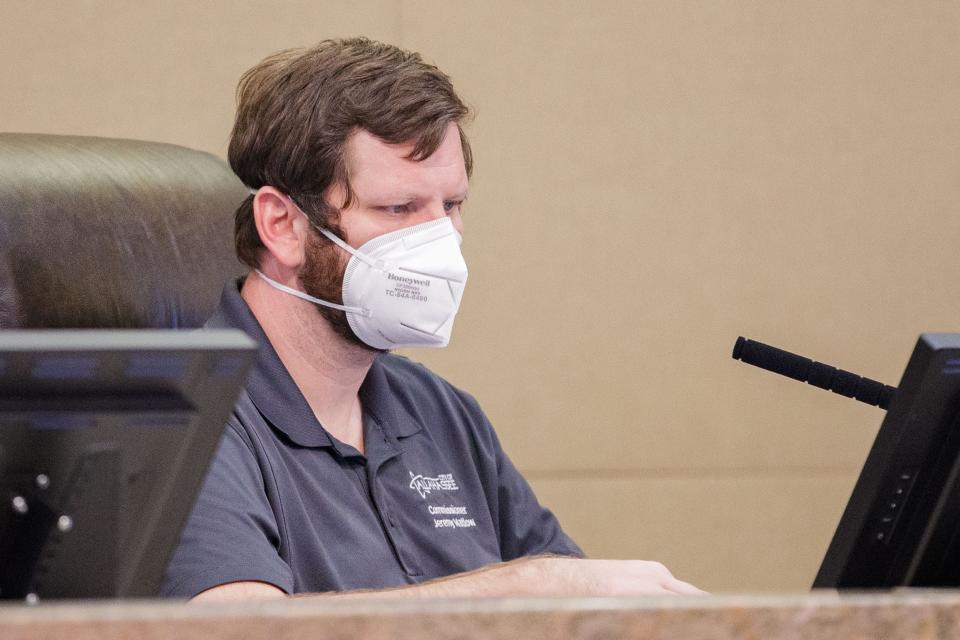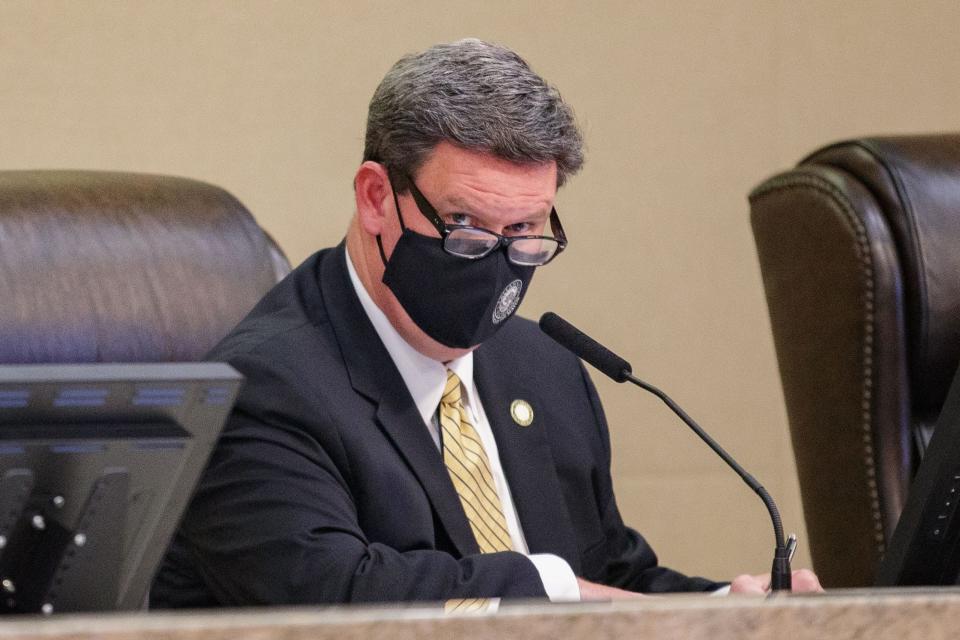To be continued: Proposed lobbying, ethics laws to come back to City Commission

- Oops!Something went wrong.Please try again later.
Recommendations from the Independent Ethics Board to beef up city lobbying restrictions and close loopholes allowing unregistered lobbyists to operate without consequence will come back to City Commissioners for more discussion.
Commissioners voted unanimously to bring back lobbying and other recommendations for discussion during their March meeting. The move came during a commission workshop Wednesday with the Ethics Board.
The recommendations include expanding the Ethics Board's jurisdiction to include lobbyists appearing before the city, revising the definition of a lobbyist to clear up ambiguity in city ordinances and requiring lobbyists to maintain contact logs with government officials that would become public record in three days.
Carlos Rey, chairman of the Ethics Board, told commissioners that the city's definition of lobbying is "circular," saying lobbying is what a lobbyist does and a lobbyist is one who lobbies.
"You scratch your head wondering what does that mean exactly," Rey said. "So our proposal is to ... hold lobbyists to a higher standard."
More: 'Ghost lobbyists': Citizens for Ethics Reform calls on city to close loopholes
More: Split votes, ethics complaints and double standards: City commission deadlocks on greater oversight
City Hall has a long history of lobbyists and self-described consultants playing fast and loose with local lobbying rules. The problem came under the microscope last summer during the public corruption trial of John "J.T." Burnette, which included testimony about the machinations of former City Commissioner Scott Maddox's secretive lobbying firm, Governance.

The Tallahassee Democrat reported in 2020 on consultants who were frequently involved in behind-the-scenes policy decisions but didn’t register as lobbyists.
INSIDE INFLUENCE:
Public policy, secret sway and 'schmoozing' in Tallahassee, Leon County
THE MAN BEHIND THE CURTAIN: How Drew Jones wields influence in Tallahassee
Ben Wilcox of Citizens for Ethics Reform said more needs to be done to address "ghost lobbyists" who don't register or disclose their clients. He noted such individuals also raise money for candidates and then lobby on behalf of the donors.
"It’s been more than two years since the Tallahassee Democrat exposed these ghost lobbyists," Wilcox told commissioners. "My question is do you just not care?"
More: 'I let all those lines cross': Scott Maddox on his descent from public service to bribery
More: 'A real tragedy for our community': Burnette verdict news reverberates at Chamber Conference
City Attorney Cassandra Jackson defended the city’s lobbying ordinance, saying she took exception with the description of circular definitions.

More: Unregistered lobbyists, consultants pull strings on local policy. See what we uncovered
“I think it’s very clear,” she said. “If you look at the definition of lobbying, it describes what lobbying is. It’s a written or oral communication where you’re trying to advance a particular position ... that’s going to go for a vote before the City Commission. You’re a lobbyist if you do that and you’re being paid.”
Commissioner Jeremy Matlow suggested including real estate and communications professionals in the lobbying ordinance and said the city should “zoom in on penalties and holding people accountable.”
“I tend to think the current definition covered a lot of people that should be registering,” he said. “But I do think the suggested definition makes it very clear who you are and what you need to do.”
The discussion included dueling legal opinions from the Ethics Board and the city on whether the board’s jurisdiction extends to Blueprint or the Community Redevelopment Agency. City commissioners recently voted that it does not, though the Ethics Board took the opposite view, setting up the potential for the courts to settle the question.
More: Split votes, ethics complaints and double standards: City commission deadlocks on greater oversight

Matlow moved for staff to bring back information on holding a voter referendum on whether to include CRA elected members and staff in the Ethics Board’s jurisdiction. The motion failed 3-2, with Mayor John Dailey and Commissioners Dianne Williams-Cox and Curtis Richardson voting no.
Dailey said he didn’t want to take a “piecemeal” approach to charter amendments until the city goes through a formal charter review process.

“I’m not going to support any amendments to the charter ... until we have a healthy discussion on the full charter review committee and process, which is the standard for every municipality every 10 years or so. I think it’s time for a full charter review.”
The commission also grappled with how to define misuse of office, one of the more common allegations lodged against public officials in state ethics complaints and the subject of city debate for years.
The city code used to require officials to have acted “corruptly,” a high legal bar involving intent that makes it difficult to prosecute such cases. In 2017, the Ethics Board recommended the city change the standard. But the commission, which at that time included Maddox, voted against doing so.
More: City commissioners nix key wording in ethics ordinance
A new commission in 2019 lowered the bar so that violations would occur if an official “knows or should have known” that their actions created a special benefit for someone. However, Ethics Board counsel John Reid said that standard has proven to be “a little too low” and could land commissioners in trouble for such routine activities as ribbon-cuttings.
The Ethics Board recommended moving to a standard that officials’ actions were “inconsistent with the proper performance” of their office to find a violation. City commissioners voted to revisit that question later.
Contact Jeff Burlew at jburlew@tallahassee.com or follow @JeffBurlew on Twitter.
Never miss a story: Subscribe to the Tallahassee Democrat using the link at the top of the page.
This article originally appeared on Tallahassee Democrat: Tallahassee Ethics: Proposed lobbying, ethics laws to come back to City Commission

